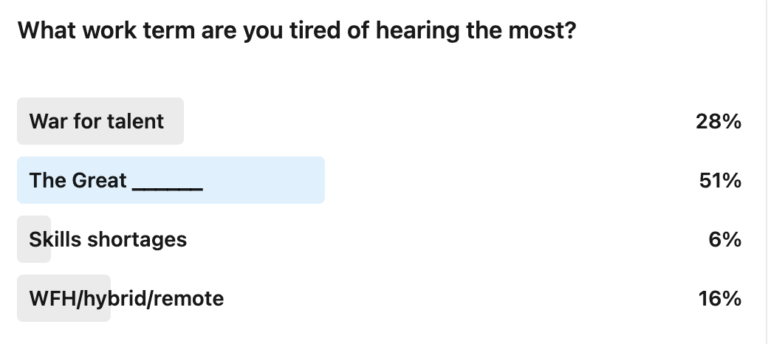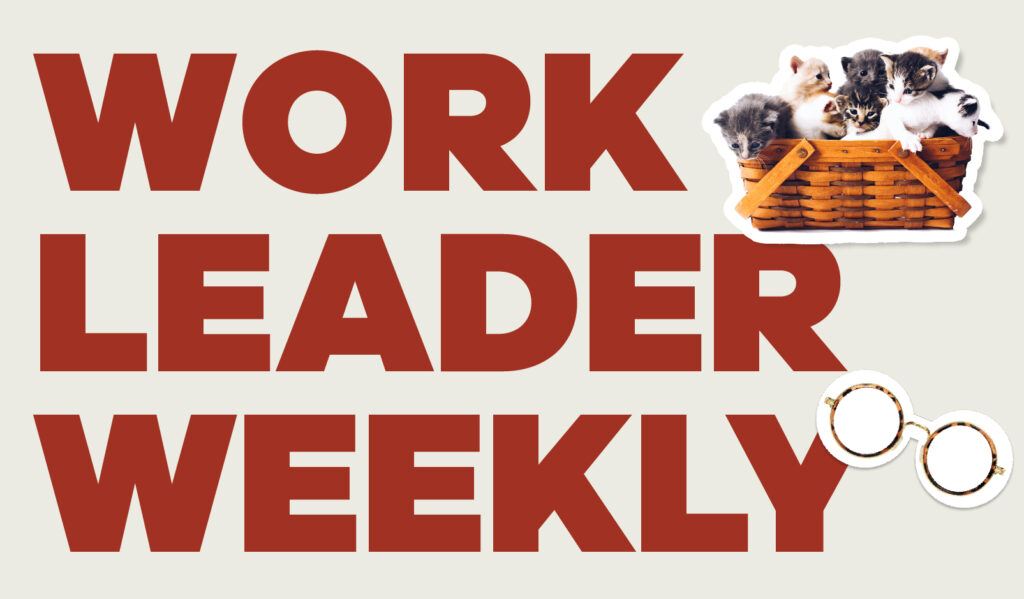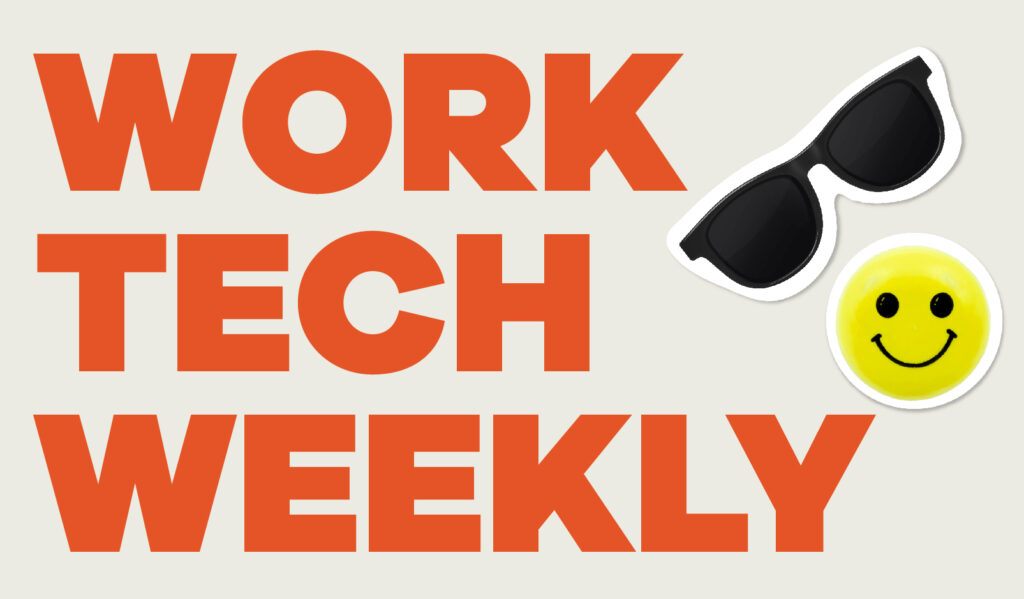Hello.
In this edition of the newsletter, we’re following the end of the good days of WFH, our readers’ thoughts on which work term they hate the most, and how Ice-T doesn’t care about your font preferences. But first, let’s talk AI again.
Let’s jump into it.
Can AI be stopped, at least for a bit?
I’ve mentioned this before, but late last year was a revelation in AI with the public release of GPT-3. People outside the world of tech and outside the world of work reached out to me and told me I had to try this new thing. I already had.
Since then, GPT-4, Google’s Bard, and numerous other AI launches have dominated Q1 of 2023.
Sometimes it takes a revelation to understand the consequences of new innovation. For example, while the first powered flight was in 1903 and planes played an emerging role in World War I, it wasn’t until commercial planes capable of flying across the country or an ocean that regulations emerged in the U.S. to make air travel safer. It took two decades after the first flight for the Aeronautics Branch of the Department of Commerce to be formed.
Yes, the cart often comes before the horse until revelation hits. Then, concern grows.
So this week, an open letter from The Future of Life Institute signed by Apple co-founder Steve Wozniak, Skype co-founder Jaan Tallinn, politician Andrew Yang, and even Tesla co-founder and current Twitter boss Elon Musk has asked the seemingly impossible: Pause most leading AI development right now for half a year.
[W]e call on all AI labs to immediately pause for at least 6 months the training of AI systems more powerful than GPT-4. This pause should be public and verifiable, and include all key actors. If such a pause cannot be enacted quickly, governments should step in and institute a moratorium.
AI labs and independent experts should use this pause to jointly develop and implement a set of shared safety protocols for advanced AI design and development that are rigorously audited and overseen by independent outside experts. These protocols should ensure that systems adhering to them are safe beyond a reasonable doubt. This does not mean a pause on AI development in general, merely a stepping back from the dangerous race to ever-larger unpredictable black-box models with emergent capabilities.
A cooperative pause would be impressive, but it’s likely a long shot. That said, major industry players in AI have an incentive to placate concerned parties: Future customers simply won’t buy creepy technology over the long haul.
Given that this development work is happening globally, it would require the cooperation of governments around the world to mandate a pause if companies don’t agree to it. If a global pandemic with literal lives on the line couldn’t get government heads on the same track, certainly a more existential crisis of AI seems unlikely as well.
Is all hope lost for meaningful guardrails for AI, then? I don’t think so.
What is clear, though, is that pressure has to come from multiple angles. It can’t be just companies self-regulating, or governments, or the ultra-wealthy and elite. Scientists, researchers, businesses, and even consumers have a role to play in responsible and ethical AI.
Let’s keep checking our work and each other as we navigate this time together.

Weekly LinkedIn poll result
 Crisis averted on the polling this week. This week, we asked what work term you are tired of hearing the most, and a vast majority of folks said The Great Resignation/Reset/Rethinking. A few others noted I missed the “Quiet ______” trend, and that would’ve been their choice. That’s not a bad choice, either.
Crisis averted on the polling this week. This week, we asked what work term you are tired of hearing the most, and a vast majority of folks said The Great Resignation/Reset/Rethinking. A few others noted I missed the “Quiet ______” trend, and that would’ve been their choice. That’s not a bad choice, either.
What’s probably most remarkable is that we are now in the 25th year of the “War for Talent” and it still ranks highly on the list of terms people are most tired of. That’s staying power, baby. Good job to McKinsey on, as the kids say, a banger.

Quick hits from around the web
What else is happening?
The glory days of work-from-home are behind us. Let me tell you, those were not, in any shape or form, glory days. (Gizmodo)
Amazon workers fume after HR rejects petition against return-to-office. 30,000 employees signed the petition asking to soften the three-days-on-site requirement. (NY Post)
What is a human’s place in the AI future of work? We’re big fans of Dr. Tomas Chamorro-Premuzic and this is worth listening to, if you’re interested. (Fast Company)
Sanders confronts Starbucks’ Schultz over labor law violations. The mega coffee chain is pushing back hard on unionization drives. (The Hill)
The future of immersive work in the metaverse. Organizations begin to take a more realistic approach to incorporating metaverse components into their work. (VentureBeat)
The truth about ‘fake work’ or coasting in tech. Uncomfortable truth points back to poor leadership and management being the culprit for perceived coasting. (Business Insider)
Build benefits and culture to support digital nomads. If part of your remote work strategy is courting digital nomads, there are a few nuances to pay attention to. (EBN)
How the HR leader of an artificial intelligence org relies on the tool. HR leaders at HR solutions always have interesting takes on the world of work. (HR Executive)
Survey: HR pros, stressed from understaffing, need a better tech stack. Confirming what everyone in HR has been telling me for the last forever years. (HR Dive)
How to engage employees in future workspaces. Take a proactive approach to your transformation and provide stability to engage folks. (Fast Company)
Indeed lays off 15% of workforce. Shame to see some good folks depart the job board giant as momentum swings temporarily away from recruiting in some sectors. (ERE)
Could chatbots help HR evolve into a more strategic business function? Prioritizing the right kinds of HR/employee connections could be key to focusing on the right things. (HR Brew)
Rage applying: Worry trend or passing fad? Probably a passing trend by definition since nobody has the energy to do this shit forever. (TLNT)
Apple will spy on workers to enforce return-to-office mandate. Peeping at badge scans is what entry point systems specifically sell as an advantage to their systems. (NY Post)
Ice-T does not care for your hot font takes
Ice-T is happy to share wisdom through his Twitter account on a regular basis, and as long as you’re good for some NSFW language, it’s usually pretty solid.
This week, Ice-T tweeted out the quote, “The illusion of ‘options’ really got y’all out here fumbling genuine people.” Nice quote but the font choice of Comic Sans ruffled more than a few of his fan’s feathers.
In response to a comment about a font most people use for their kids’ birthday party, Ice-T replied, “I do not give a flying F— about Fonts… Weirdo shit.”
Ice-T is 65 and has earned the right to not put up with your font slander.

That’s it for this week!
Lance




